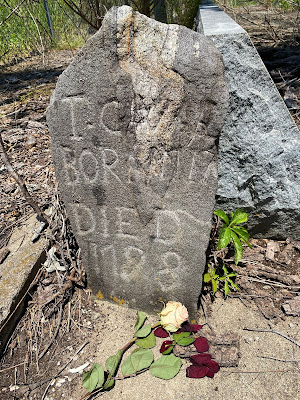The wife of Thomas Camp (1717 - 1798) of Rutherford County, North Carolina is named in the John Camp (1743 - c.1818) family bible as his mother "Winniford Starling." (Source: Genealogical Records Committee, Arkansas DAR, Vol. IX, pgs. 137-140, NSDAR Library, Washington D.C. "Bible owned by Mrs. E. H. Abington, Beebe, Arkansas." Camp-Kemp Family History by Mann)
This seems to be partially corroborated by an old claim by W. A. Camp (1852 - 1906) that one of the children of Thomas Camp was named "Starling Camp" and that his wife was named Winifred Starling. Winifred appears in multiple SAR applications in the early to mid-twentieth century, with her name is given in full, her dates as 1720 - 1761, and marriage as 1738. The SAR application of Wilfred Camp Moon in 1924 additionally gives her place of death as Halifax County, Virginia.
Since these sources seem to be quite old and probably credible, we can theorize that Winfred was almost certainly descended from a Starling family of Virginia. Our only traditional clue is that she is said to have been "of Welsh descent" by W. A. Camp. The identity of her father is given as Richard Starling by Robert Mann in his Camp-Kemp Family History, but does not appear to be based on records. A Richard Starling died testate in Accomack County, Virginia before Aug. 10, 1710, but he seems to have died too early to have been her father.
Online family trees almost always give her father as a Richard Starling who lived from 1694 to 1720; he even (unfortunately) has a memorial on Findagrave. There's just one problem: he doesn't seem to exist. He appears to have been a creation of genealogist Russ Williams. As told on Elroy Christensen's old genealogy site on the Camp/Kemp family "this record is a conjecture of Russ Williams who deduced that there had to have been another son of Richard Starling since Richard Sterling/Starling was to have died ten years prior to the birth of Winifred Starling." The 1720 "death date" appears to refer simply to Winifred Starling's presumed birth date.
So this fictitious Richard Starling was a stop-gap measure designed to explain the ten year difference between the death of Richard Starling and the birth of Winifred. This has been copied and pasted across the internet for decades, with no evidence.
Given the scarcity of the name in the early 18th century records, it seems the only Starling in Virginia who could be her father is John Starling (c.1695 - 1770) of Accomack County, Virginia, a likely son of Richard Starling (1669 - 1710).
The two men do have a bit of a connection via the Booth family of Accomack County. Richard Starling witnessed the will of John Booth in 1706 wherein John Booth names an under-aged son as George Booth. George wrote his own will in 1762 naming his godson "William Sterling, son of John Sterling." This shows a strong familial connection, and suggests that Richard Starling did in fact have children and the Starlings of Virginia and North Carolina may descend from him.
Richard's children may have been John Starling, Ann Starling Robbins and Isaac Starling.
John Starling's estate was probated by his wife Rachel on January 30, 1770. No heirs were named, but he is known to have had at least one proven son, William Starling (c.1725 - 1775) and one likely son, Isaac Starling (d. aft.1778), both of Accomack County. The family name is also frequently written as "Sterling."
"My daughter Ann Starling Robbins" was named in the will of William Robbins of Accomack County, Virginia on Nov. 27, 1718, suggesting another early Starling relative.
Isaac Starling Jr. (d.1764), of Chowan and Northampton County, North Carolina had children named Abraham, John, Sarah, Rachel, Ann, Mary, Elizabeth, Thomas and Isaac in his will, dated May 3, 1760. He was called "Isaac Starling Jr." in a North Carolina land grant of 1723. Winifred Starling is not likely a child of Isaac (she is not named in his will), but his presence shows that there were Starlings that migrated into North Carolina, as the Thomas Camp family did. There is an Isaac Starling that was transported to Virginia in 1663 (headright grant), and though he's much too old to be Winifred's father, he could perhaps have been a brother of Richard, having no known descendants himself.
=JMF


.jpg)


No comments:
Post a Comment